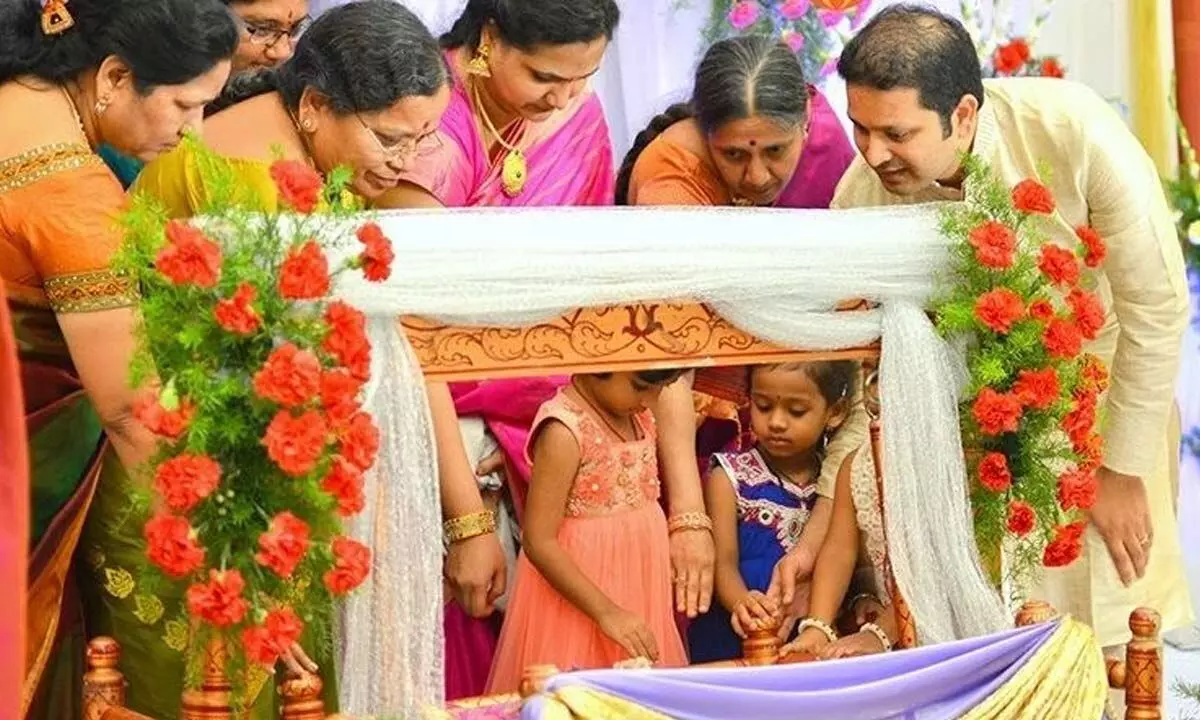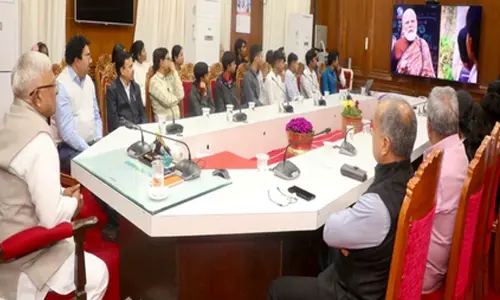Significance of names: Understanding wisdom and fusion

In Bharat, naming a child is not just a ritualistic formality but a sacred ceremony deeply rooted in ancient texts and traditions
In Bharat, naming a child is not just a ritualistic formality but a sacred ceremony deeply rooted in ancient texts and traditions. The naming ceremony, known as Naamkaran, is one of the most important sacraments of life, typically performed on the 11th or 12th day after the birth of a child. The ritual process begins with the purification of the home and family, followed by an invocation by a priest who chants Vedic hymns and invokes blessings from various deities. Offerings of ghee, rice, and herbs are made to the fire, symbolizing the family’s dedication and seeking divine favor for the child.
The child’s horoscope, or Janam Kundali, is consulted to select the first letter of the name, aligning it with the child’s astrological chart to ensure harmony with their destiny. The chosen name is then whispered into the child’s ear three times by the parents or grandparents, marking the official conferment of the name. This act is believed to imbue the name with sacred energy, shaping the child’s identity and future.
Ancient texts provide detailed guidelines on how to select a name, emphasizing the importance of meaning, phonetics, and spiritual resonance. Names are chosen for their positive meanings and connotations, often reflecting virtues, attributes of deities, or natural elements. Sound and vibration are preferred, as they are believed to resonate positively and influence the person’s life force, or Prana.
Names may also be selected from sacred texts such as the Vedas, Puranas, or epics like the Mahabharata and Ramayana, providing a sense of identity and continuity. Numerology and astrology are also considered, ensuring that the name aligns with auspicious numbers and planetary positions, which are believed to influence the child’s fate and fortune.
The name given to an individual in Bharat has a profound impact on their personality, destiny, and spiritual journey. It provides a sense of identity and continuity, shapes self-perception and societal roles, and can have psychological and social effects. It is believed that names can have karmic implications, influencing an individual’s life path and interactions with the cosmos. Understanding and respecting these traditions offers insight into the rich tapestry of beliefs and the timeless connection between name, identity, and destiny.
For instance, Sahasranama, (meaning “a thousand names,”) is a collection of a thousand epithets used to honor deities. These compilations are significant in worship and play a profound role in the cultural practice of naming individuals. Each name within a Sahasranama encapsulates divine attributes and ideals, making them a rich source for personal names that carry spiritual, cultural, and philosophical significance.
Prominent Sahasranama include Vishnu Sahasranama, which lists the thousand names of Lord Vishnu, Lalita Sahasranama, which enumerates the thousand names of Goddess Lalita, and Shiva Sahasranama, which compiles the thousand names of Lord Shiva. These texts are recited and revered for their spiritual benefits, believed to invoke divine presence and blessings.
Names derived from Sahasranama carry significant weight and are chosen for various reasons that impact an individual’s life in profound ways. They often reflect divine attributes, helping to establish a direct spiritual connection between the individual and the deity. For example, a name like Madhava (a name of Vishnu) or Parvati (a name of Goddess Parvati) not only signifies a connection to these deities but is also believed to invoke their protection and blessings throughout the person’s life.
Names carry inherent vibrations that influence the mental and spiritual well-being of an individual. Names like Lakshmi (derived from the Goddess of wealth) are believed to carry vibrations of prosperity and abundance, potentially attracting positive energies into the person’s life.
Names derived from the Sahasranama have far-reaching impacts on an individual’s life, extending beyond mere identification. They are imbued with spiritual resonance, carrying forward ancient traditions and cultural values, ensuring the preservation of rich heritage and providing a link to ancestral roots. Additionally, they inspire individuals to live up to the qualities their names symbolize, guiding their actions and decisions in alignment with spiritual and moral principles.
Traditional names have historically held deep meanings, reflecting virtues, divine attributes, or natural elements. However, with modernization and globalization, naming conventions have evolved, leading to a dynamic and diverse naming landscape. Traditional names are often derived from ancient scriptures, epics, and the names of gods and goddesses. These names serve as more than mere identifiers; they are imbued with cultural, religious, and moral significance.
Contemporary names still carry meanings but reflect a shift in trends and influences. Modern names often blend traditional roots with contemporary sounds or structures, such as “Aarav” (peaceful) maintaining traditional meaning while having a modern, global appeal. Padma Vibhushan Chiranjeevi ‘s granddaughter’s name is from Lalitha Sahasranama, “Klin Kaara’ . They are often simpler and globalized, catering to a global audience, and are more innovative and unique, with parents choosing or inventing names that are distinct yet still meaningful.
In one of the Horlicks advertisements, a mother calls her son with a name ‘Tojo’, viewer is confused to relate till the boy appears on the screen. Nicknames like Sony, Browny, Sweety, Bunny, zippy, Mummy, Honey are commonly derived from non- living used for all living creatures on earth.
Traditional names emphasize deep cultural, spiritual, and moral meanings, while contemporary names focus on uniqueness, simplicity, and cross-cultural appeal. They are strongly connected to scriptures, and cultural heritage, reflecting divine attributes or spiritual ideals. Contemporary names reflect modern values or a fusion of different inter-cultural elements.
Traditional names can be complex and rooted in Sanskrit, reflecting ancient linguistic traditions. They tend to be simpler and more universally accessible, designed for easy pronunciation and global acceptance. Astrological and ritualistic considerations play a role in choosing traditional names, which are often chosen based on astrological charts and religious rituals. Conversely, contemporary names focus less on astrology and more on personal preference, although some parents still consider astrological compatibility.
Contemporary names do not continue to carry significant meaning and reflect the changing dynamics of modern society. There is a need for balancing traditional significance with the demands of a globalized world, providing a versatile approach to naming that honors the past while embracing the future. This evolution in naming practices highlights the adaptability and enduring relevance of cultural traditions in a rapidly changing world.














